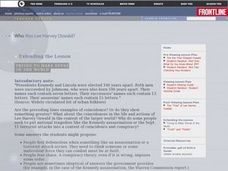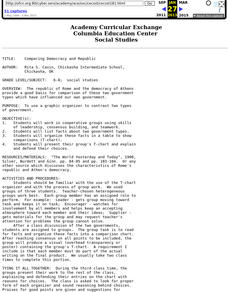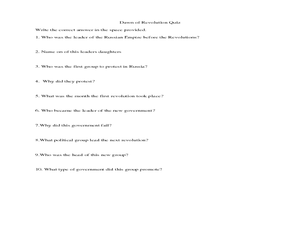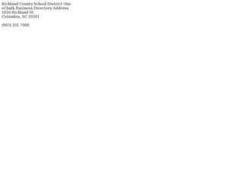Curated OER
Trying to Make Sense of the World
Students view video clips of September 11 and the assassination of John Kennedy. They discuss why these events hold such an importance to the United States. They also examine the role of coincidence and conspiracy in these types of...
Curated OER
World War II History Textbooks Project
Students, in groups, research and compare how events of World War II are treated in various countries' school textbooks through linking with another classroom from that country.
Visa
Making Spending Decisions
By role playing real-world experiences, such as purchasing snacks and grocery/toy store shopping, your youngsters will begin to develop an understanding of how to make decisions and choose between alternatives. This is the first lesson...
Curated OER
Cultures Around the World
Learners examine the types of celebrations around the world. They create pictures of animals speaking another language than their own and draw flags of countries around the world. They also retell a folktale to their classmates.
Curated OER
Comparing Democracy and Republic
Middle schoolers use a graphic organizer, a T-chart, to contrast two types of government. They list facts about the two governments, and explain and defend their choice of facts to include.
Curated OER
Russian Revolution Part 1
Ninth graders consider how the outcome of World War I contributed the Russian Revolution. In this Russian Revolution lesson, 9th graders watch the movie "Anastasia," and discuss the conditions that led to revolution in Russia.
Curated OER
The Enemy that Never Was
Students conduct research and explain in a speech why Japanese Canadians were not a threat to Canada during the Second World War.
Curated OER
The Enemy that Never Was
Students write speeches explaining why Japanese Canadians were not a threat to Canada during World War 2. In this Japanese Canadians lesson plan, students learn about racism, and how the Japanese were targeted but not a threat during the...
Curated OER
A Proper Role for Government - Seeking Perfection in an Imperfect World
Students discuss the proper role of government in the economy. Reviewing the foundations for a market economy to work properly, they decide how to best direct resources to get the most out of them. They distinguish between private and...
School Improvement in Maryland
Political Systems: Advantages and Disadvantages
Every political system has advantages and disadvantages. To gain an understanding of these differences, groups investigate the political system of another country—oligarchy, monarchy, dictatorship, parliamentary—and prepare a...
School Improvement in Maryland
Executive Order
After reading information about Executive Order #9066, class members assume the voice of an 18 year-old Japanese-American born in California and placed in an internment camp. Individuals then craft a letter to President Roosevelt...
US Institute of Peace
Organizations Working for Peace
We're all in this together! Show young scholars that peace is a process and having the support of like-minded people can make it happen. 13th in a series of 15 peace building activities, groups conduct research on a peace organization,...
Curated OER
Empire State-Building
Learners explore how empires around the globe have impacted the world in which they have existed. They analyze whether or not the United States is an imperialist nation and create their own empires based on their understanding of empires...
Curated OER
Civilizations of the Ancient Near East
Sixth graders investigate ancient civilizations by creating a research project. In this world history lesson, 6th graders investigate historic civilizations developed close to important rivers of the near East. Students create a...
Deliberating in a Democracy
Cloning
Students explore the issues and challenges of cloning. In this cloning lesson plan, students read about how cloning affects people and the types of cloning, then they prepare a debate either for or against cloning.
Curated OER
TB - Lusitania Day (1916)
Students, after brainstorming all the different types of propaganda, explore, analyze and study the nature, origin and purpose of propaganda and how its aims are achieved. They assess how the sinking of the Lusitania was manipulated by...
Curated OER
Memorandum Regarding the Enlistment of Navajo Indians
Young scholars examine the Navajo dictionary used by the U.S. military in W.W. II. They role-play Navajo messengers and Marine Corp staff. They research the Battle of Iwo Jima and confirm or discount the claim that Navajos made the...
Curated OER
The Language of Human Rights
Did you know that there are 15.2 million refugees in the world? High schoolers will read "The Universal Declaration of Human Rights" and learn how they can get involved to lower this surprising number. To really encourage involvement,...
Curated OER
The Art of Protesting
Students view various images to examine different types of protest Americans have used throughout history, and explore ways in which protest can produce change for better or worse.
National Endowment for the Humanities
Revolution '67, Lesson 2: What Happened in July 1967? How Do We Know?
Even in a world in which dozens of participants and curious onlookers record every controversial event, the basic facts of what happened are often in dispute. Revolution '67, Lesson 2 explores 1967 Newark, New Jersey using an examination...
Curated OER
Missing Macroinvertebrates - Stream Side Science
Field study groups collect samples of stream water and identify the macroinvertebrates found. Using their data, they calculate a water quality index to rate the health of the stream. They graph their data and discuss the value of a water...
Curated OER
Latin America and United States Policy Today
Young scholars compare the situation of Latin American immigrants with the situation of immigrants from other areas of the world. They use media to obtain information on topics of academic interest, personal interest, and intellectual...
Skyscraper Museum
Changes in a City Over Time
Investigate the growth and development of New York City with the final lesson in this four-part series on skyscrapers. Learners first explore the concept of urban growth by looking closely at a series of three paintings made of Wall...
Curated OER
A Date Which Will Live in Infamy
High schoolers analyze Franklin D. Roosevelt's "Day of Infamy" War Address. Students read the original first typed draft of the speech, and compare handwritten changes with the original to determine whether the changes strengthened or...

























